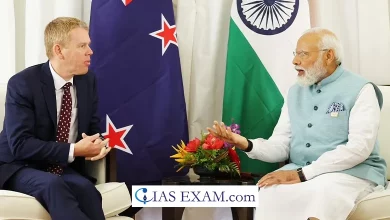
Context:- In July 2023, India and Japan agreed to collaborate on semiconductors in order to create a more resilient supply chain for this essential technology and to jointly expand the semiconductor ecosystem.
India – Japan collaboration:-
- India and Japan have joined forces to collaborate on semiconductors, with the goal of strengthening the supply chain for this critical technology. Their goal is to collaborate on the growth of the semiconductor ecosystem, with a focus on five main areas:
- semiconductor design
- manufacturing
- equipment research
- establishing resilience in the semiconductor supply chain
- Talent development
- The collaboration focuses for technological transfer, semiconductor research collaboration, and reciprocal trade. It also promotes human resource development through skill exchange programs, workshops, and training.
- The collaboration promotes the exchange of technological knowledge, research, and innovation between the Indian and Japanese semiconductor sectors, maintaining Japan and India at the forefront of semiconductor development.
Semiconductor:-
Semiconductors are essential in many industries, including aerospace, vehicles, communications, clean energy, information technology, and medical devices.High demand for semiconductors has resulted in a global chip scarcity, affecting economic growth and employment creation.
Policy Alignment and Challenges:-
- The “Make in India” strategy in India is aimed at increasing indigenous manufacturing and technology.The “Society 5.0” goal of Japan prioritises technological self-sufficiency and progress driven by innovation.
- The India-Japan collaboration is important in defining the global semiconductor landscape. Their collaboration targets increasing technological issues such as downsizing, artificial intelligence, and quantum computing.
- When considering the booming semiconductor sector, the relevance of the collaboration becomes clear. Because of the growing demand for specialized chips, a larger skill pool and additional semiconductor fabrication facilities are required.
Strengthening Relationship:-
- India and Japan have acknowledged the value of semiconductors in promoting innovation, economic prosperity, and national security.
- Japan has a sophisticated semiconductor sector and is a global leader in semiconductor manufacture.On the other side, India has a burgeoning IT sector, which is driving up demand for semiconductors.
- As a result, the cooperation uses Japan’s technological prowess and India’s creativity and design capabilities to build a mutually advantageous relationship.
- The challenges caused by supply chain interruptions and geopolitical conflicts, particularly in the Indo-Pacific area, can be addressed by initiatives launched by India and Japan.
Supply chain:-
Supply chain disruptions and geopolitical tensions, particularly in the Indo-Pacific region, can be resolved through initiatives launched by India and Japan. Countries can combine resources and expertise to solve challenging challenges in semiconductor design, manufacturing processes, and materials science through joint research efforts. This would promote innovation and the creation of cutting-edge solutions while simultaneously focusing on human resource development through skill exchange programs and training.
Link with America:-
India and the United States of America have formed a technological cooperation to address investment, innovation, and workforce development. The U.S.A recently sponsored the CHIPS and Science Act (2022), which imposes strategic constraints on the expansion of chip manufacturing in nations such as China that could constitute a direct threat to the U.S.A .





.png)



